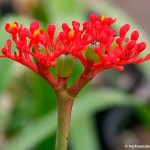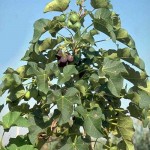I’m personally thanking Dr. Eric Tayag, director of the National Epidemiology Center (NEC) of the Department of Health, for the first-hand information that he shared with Mum Writes Health Stuff about tuba-tuba plant which recently caused sickness and death to kids who ate them.
Thanks Doc!
Brief description of Jatropha:
- It’s (tuba-tuba) an unfamiliar plant that looks like an innocent plant. It’s a shrub belonging to the Jatropha species. It grows anywhere and can be an ornament or decoration.
- All parts of the plant can contain poison at levels intolerable even to animals, but it has medicinal uses (we are told) particularly the leaves and roots.
- If you get too much, you get the ill effect rather than the medicinal.
- It can be used as a purgative (laxative). It contains a poison named Curtin.
- Once ingested, there is abdominal pain. There’s discomfort in the throat and then may rapidly cause dehydration and hemorrhagic gastroenteritis. The patient may collapse within minutes.
- Patient will have stomach ache, feels nauseated, vomit, experience diarrhea or bloody stool.
- Patient can die from dehydration.
- Children are affected because they are the ones who usually pick it up to play.
Treatment:
- What you can do is dilute the poison as fast as you can by giving milk or fluid to dilute the poison and then induce vomiting.
- At the hospital, activated charcoal powder is given to patient to absorb the remaining poison inside the body and then cathartic is given to expel the poison.
Warning:
- Do not touch plants that you are unfamiliar with. Never eat or use any of its fruits, seeds for whatever reason without checking to those who know if it is poisonous or not.
- Warning is don’t let children or if children go out they should not just pick any fruit from any plant that they are unfamiliar with.
- Stick to those you are familiar with like mango. Do not eat any unfamiliar fruits even if it looks delicious.
Recommendation:
- You can contact the Department of Agriculture to identify the particular plant or you can contact the Poisons Center at the UP-PGH so that you’ll be given directions of how to use or not use it.
Photo credits:Â Internet



